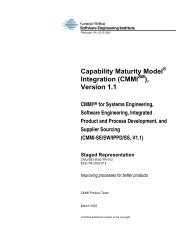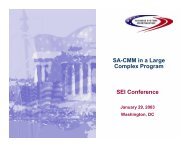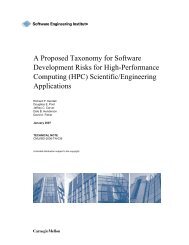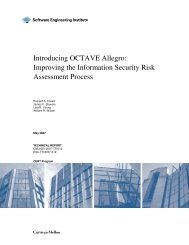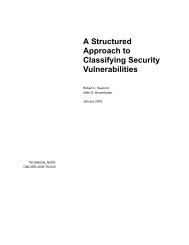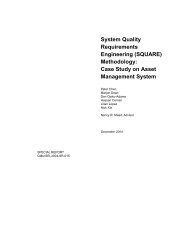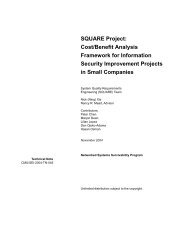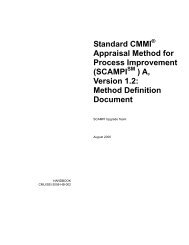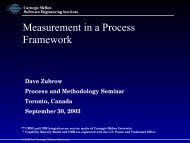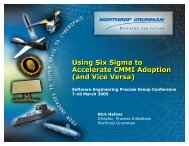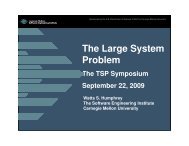State of the Practice of Computer Security Incident Response Teams ...
State of the Practice of Computer Security Incident Response Teams ...
State of the Practice of Computer Security Incident Response Teams ...
You also want an ePaper? Increase the reach of your titles
YUMPU automatically turns print PDFs into web optimized ePapers that Google loves.
Fur<strong>the</strong>rmore, CSIRT members must be familiar with any laws or regulations that may affect<br />
<strong>the</strong>ir incident response and coordination efforts, such as requirements to notify o<strong>the</strong>rs in <strong>the</strong><br />
event <strong>of</strong> a security breach. (For example, a 2003 law in <strong>the</strong> state <strong>of</strong> California requires anyone<br />
who “conducts business” with any California resident to disclose any breach <strong>of</strong> security<br />
<strong>of</strong> a system involving <strong>the</strong> unauthorized acquisition <strong>of</strong> <strong>the</strong> resident’s unencrypted personal information.<br />
116 ) Several specific laws and regulations will be mentioned in <strong>the</strong> next sections.<br />
In recent years, guidelines and standards for obtaining and handling computer evidence have<br />
been developed by a number <strong>of</strong> sources. For example, <strong>the</strong> International Organization on<br />
<strong>Computer</strong> Evidence (IOCE) 117 developed a short set <strong>of</strong> principles for standardizing <strong>the</strong> recovery<br />
<strong>of</strong> computer-based evidence. 118 In <strong>the</strong> United <strong>State</strong>s, <strong>the</strong> Department <strong>of</strong> Justice has published<br />
detailed manuals for “Searching and Seizing <strong>Computer</strong>s and Obtaining Electronic Evidence<br />
in Criminal Investigations” 119 and <strong>the</strong> National Institute <strong>of</strong> Justice (NIJ) guide<br />
“Electronic Crime Scene Investigation: A Guide for First Responders.” 120<br />
The U.S. Secret Service and <strong>the</strong> International Association <strong>of</strong> Chiefs <strong>of</strong> Police 121 have published<br />
“Best <strong>Practice</strong>s for Seizing Electronic Evidence.” 122 And <strong>the</strong> Internet Society has published<br />
a Best Current <strong>Practice</strong> (BCP 55/RFC 3227) on “Guidelines for Evidence Collection<br />
and Archiving.” 123<br />
As applicable laws may be varied and numerous, and <strong>the</strong> interpretation <strong>of</strong> some laws might<br />
not be obvious or straightforward, it is highly recommended to seek <strong>the</strong> guidance <strong>of</strong> knowledgeable<br />
legal counsel, as well as management, in determining <strong>the</strong> response to a computer<br />
security incident. Such legal guidance should be incorporated into all incident response policies<br />
and procedures. Because <strong>of</strong> this, it is <strong>of</strong>ten recommended that a team should look to establish<br />
a working relationship with local law enforcement and with <strong>the</strong>ir own legal counsel.<br />
3.9.1 International Cyber Crime Laws<br />
It is still <strong>the</strong> case that many nations do not yet have effective laws to address computer<br />
crimes. But recent efforts by a number <strong>of</strong> different countries and organizations are setting <strong>the</strong><br />
stage for <strong>the</strong> harmonization <strong>of</strong> substantive and procedural laws among multiple nations, and<br />
116<br />
117<br />
118<br />
119<br />
120<br />
121<br />
122<br />
123<br />
California Civil Code Section 1798.82 <br />
<br />
<br />
<br />
<br />
<br />
<br />
<br />
CMU/SEI-2003-TR-001 115



